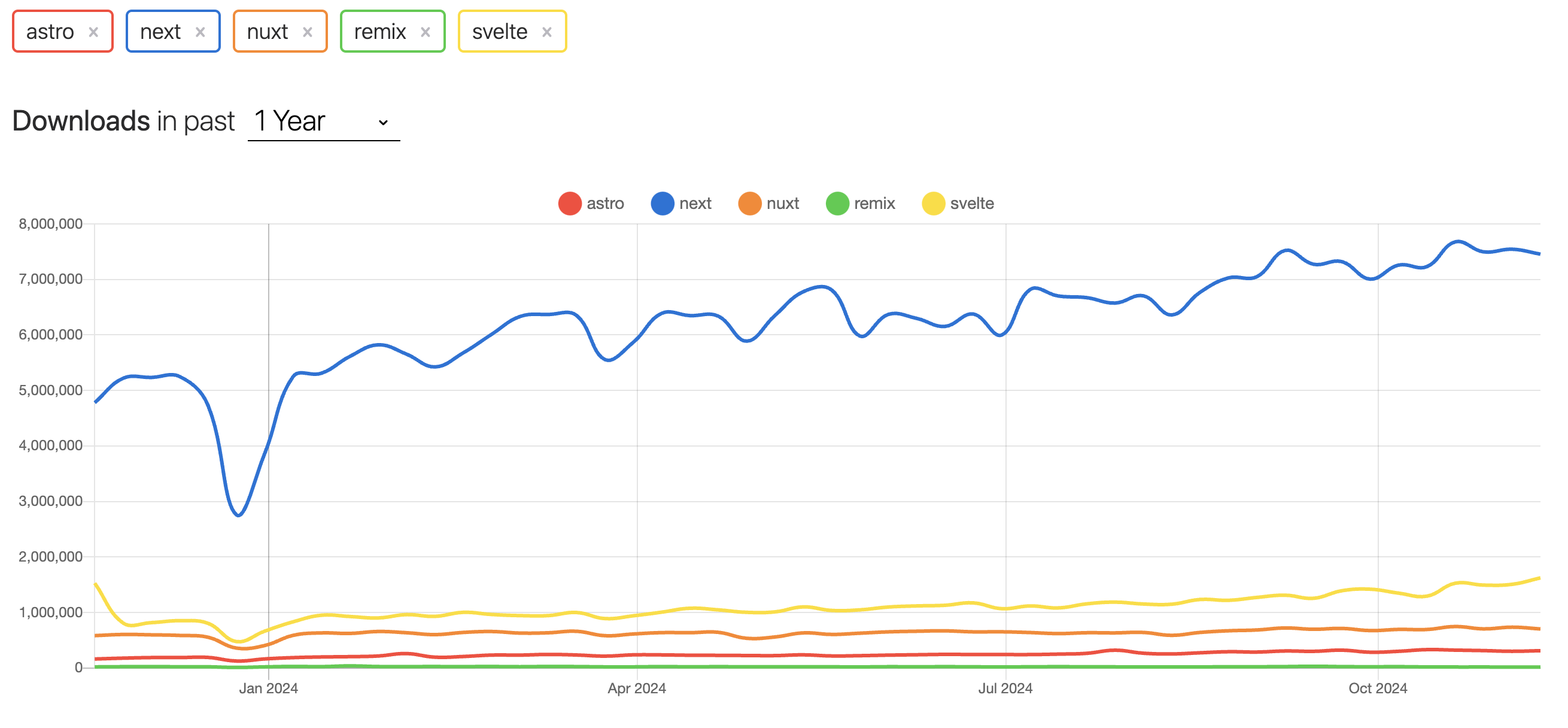Blog

Image: ©Lotsi Litzenberger 2024
Why We Recommend Next.js as a Frontend Framework
As software engineers and consultants, we're often asked about our technology choices. When it comes to frontend frameworks, our answer has become increasingly clear: Next.js is our preferred choice for building modern web applications. Here's why we consistently recommend it to our clients and use it in our own projects.
The first thing you should check before choosing a framework
Before diving into technical features or architectural decisions, there's one crucial metric that can guide your framework choice: community adoption. A framework's popularity directly impacts:
- Available resources and documentation
- Third-party integrations and libraries
- Long-term maintenance and support
- Talent pool for hiring
- Problem-solving resources
Looking at npmtrends.com, the data speaks volumes about Next.js's dominance in the frontend ecosystem:

With over 7.5 million weekly downloads, Next.js leads the pack by a significant margin. This widespread adoption translates into:
- A vast ecosystem of compatible tools and plugins
- Regular updates and security patches
- Extensive community-driven solutions
- Battle-tested production deployments
- Rich learning resources and tutorials
While popularity shouldn't be your only criterion—every project has unique requirements—it's a strong indicator of a framework's maturity and reliability. Next.js's commanding position in the market reflects both its technical excellence and the trust placed in it by developers worldwide.
So, why is Next.js so popular?
The Power of Server-Side Rendering
One of Next.js's strongest features is its flexible rendering patterns. While traditional React applications render entirely on the client side, Next.js offers server-side rendering (SSR) and static site generation (SSG) out of the box. This means:
- Better SEO performance as search engines can easily crawl your content
- Faster initial page loads for improved user experience
- Reduced client-side JavaScript bundle sizes
- Enhanced performance on lower-powered devices
Developer Experience That Matters
The developer experience with Next.js is nothing short of exceptional. The framework provides:
- Zero-configuration setup for most use cases
- Intuitive file-system based routing
- Hot module replacement during development
- Built-in TypeScript support
- Automatic code splitting for optimal performance
This translates to faster development cycles and fewer configuration headaches for teams.
Built for Performance
Performance isn't just a feature in Next.js—it's a core principle. The framework includes:
- Automatic image optimization
- Font optimization with next/font
- Built-in performance analytics
- Smart bundling and code splitting
- Incremental Static Regeneration (ISR)
These optimizations mean your applications are fast by default, without requiring extensive configuration or optimization work.
Enterprise-Ready Architecture
For larger organizations, Next.js provides the stability and scalability needed for enterprise applications:
- Rock-solid reliability backed by Vercel
- Excellent documentation and community support
- Clear upgrade paths between versions
- Enterprise-grade security features
- Seamless integration with various backend services
Sustainability Considerations
As advocates for sustainable web development, we appreciate that Next.js's performance optimizations contribute to reduced server load and energy consumption. The framework's efficient rendering strategies and automatic optimizations help create more environmentally friendly web applications.
Real-World Success Stories
We've implemented Next.js in various projects, from small business websites to large-scale applications, and the results speak for themselves:
- Faster page load times
- Improved SEO rankings
- Reduced development time
- Better conversion rates
- Enhanced user engagement
When to Choose Next.js
Next.js is particularly well-suited for:
- Content-heavy websites and applications
- E-commerce platforms
- Marketing websites
- Dynamic web applications
- Progressive Web Apps (PWAs)
However, it's important to note that Next.js might not be the best choice for every project. Simple static websites or applications with minimal interactivity might be better served by lighter alternatives.
Looking Forward
The future of Next.js looks promising, with continuous improvements and innovations being added to the framework. The recent introduction of the App Router and Server Components shows the framework's commitment to staying at the forefront of web development.
Conclusion
Our recommendation of Next.js isn't just based on its technical merits—it's based on real-world experience and proven results. The framework's combination of performance, developer experience, and enterprise-ready features makes it an excellent choice for modern web development.
Whether you're building a simple marketing website or a complex web application, Next.js provides the tools and infrastructure needed to succeed. It's not just a framework; it's a complete solution for modern web development.
Want to learn more about how Next.js can benefit your project? Let's discuss your specific needs.
#webdevelopment #nextjs #frontend #javascript #react





